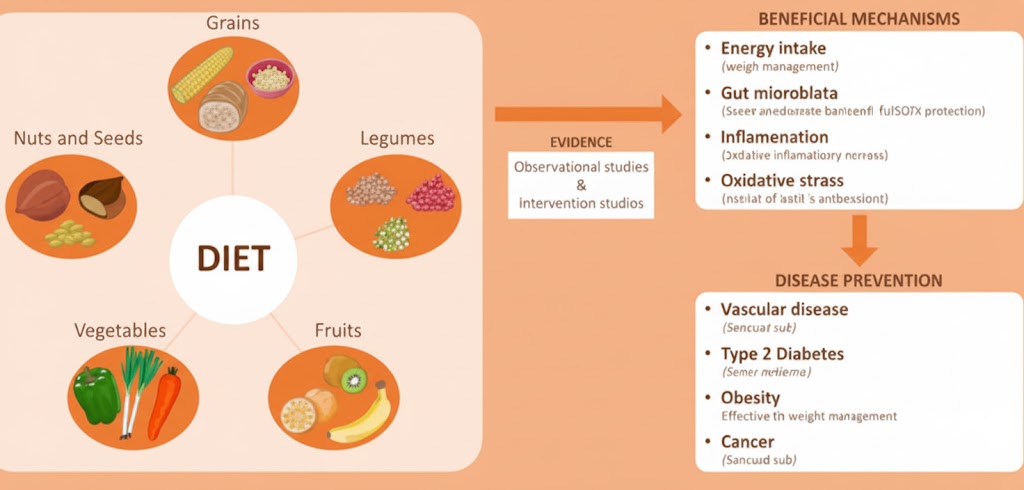Discover the Benefits of Vegetarian Diet For Better Digestion, Stronger Temperance, and Lasting Wellness
A small change in what you eat can lead to a big change in how you feel. The benefits of vegetarian diet reach into every corner of your health, influencing your digestion, mental clarity, and even your capacity for self-discipline. When you adopt plant-based eating, you gain access to protective factors like fiber and phytonutrients while naturally reducing your intake of saturated fats and cholesterol. This shift supports your body’s innate healing mechanisms and creates conditions for lasting wellness.
Plant-based diets center on foods from the Plant Kingdom — grains, legumes, vegetables, fruits, nuts, and seeds. Some variations include small amounts of eggs and dairy, while stricter versions eliminate all animal products entirely. Regardless of which approach you choose, the vegetarian diet benefits that manifest consistently include: improved cardiovascular health, better weight management, and enhanced digestive function. Research demonstrates that vegetarians experience lower risks of obesity, type 2 diabetes, hypertension, and vascular disease, making this dietary pattern one of the most protective choices you can make for long-term health.
Overall Health Benefits of a Vegetarian Diet
The comprehensive benefits of vegetarian diet patterns emerge from the synergy between what you include and what you eliminate in your diet. When you fill your plate with minimally processed plant foods, you deliver fiber, antioxidants, and beneficial compounds directly to your cells. Meanwhile, you naturally limit harmful nutrients that burden your cardiovascular and metabolic systems.
A comprehensive review, Health Benefits of Vegetarian Diets , shows that well-planned vegetarian diets are associated with lower risks of certain cancers, overweight-obesity, type 2 diabetes, dyslipidemia, hypertension, and vascular diseases. These protective effects stem from the abundance of non-processed plant foods that provide your body with numerous protective factors while limiting saturated fats and cholesterol.
Your cardiovascular system responds remarkably well to plant-based eating. Blood pressure typically decreases, cholesterol levels improve, and inflammation markers drop. Studies show vegetarians have lower mean BMI and plasma cholesterol concentrations, along with approximately 25% lower mortality from heart disease. This translates to tangible protection — you reduce your risk of heart attack, stroke, and related complications simply by changing what you eat.
The metabolic advantages extend beyond heart health. Your body processes plant proteins and carbohydrates efficiently, maintaining stable blood sugar levels and supporting healthy insulin function. This metabolic stability helps prevent type 2 diabetes while supporting sustained energy throughout your day.
Vegetarian Diet and Digestion
The relationship between a vegetarian diet and digestion represents one of the most immediate benefits you’ll notice. Plant foods naturally contain substantial fiber — the component that keeps your digestive tract functioning optimally. This fiber acts as both fuel for beneficial gut bacteria and a cleansing agent that moves waste efficiently through your intestines.
When you center your meals around grains, legumes, vegetables, and fruits, you provide your digestive system with the raw materials it needs for smooth operation. Vegetarians show lower risks of constipation, diverticular disease, gallstones, and appendicitis — conditions that often plague those eating typical Western diets high in processed foods and animal products.
The vegetarian diet and digestion connection extends to your gut microbiome. Plant-based eating cultivates diverse bacterial populations that ferment prebiotics and produce beneficial metabolites. These compounds support both intestinal and systemic health, contributing to disease prevention throughout your body.
Your gut bacteria thrive on the variety of plant fibers you consume, creating a positive feedback loop that enhances your overall digestive capacity.
Beyond fiber content, plant foods require less digestive strain than animal products. Your body expends less energy breaking down plant proteins and fats, freeing up resources for other vital functions. This efficiency explains why many people report feeling lighter and more energetic after transitioning to plant-based eating.
For additional insights on how tobacco and other lifestyle factors affect your digestive system, explore our article on Tobacco and Nutrition: How Smoking Affects Digestion and Recovery.
Relationship Between Vegetarianism and Temperance
The connection between vegetarianism and temperance runs deeper than most people recognize. When you commit to plant-based eating, you simultaneously commit to a broader philosophy of moderation and conscious living. This dietary choice naturally extends into other areas of your life, creating momentum toward healthier habits throughout.
Adopting vegetarianism transforms you into a student of wellness. You begin paying attention to meal timing, food combinations, and portion sizes in ways you never did before. This heightened awareness makes you more conscious of stimulants like caffeine, alcohol, and tobacco — substances that many people consume mindlessly. The discipline required to maintain a vegetarian diet benefits your character development as much as your physical health.
Vegetarianism and temperance work synergistically because the dietary shift removes many triggers for excessive consumption. Without rich sauces, heavily seasoned meats, and processed foods designed to override your satiety signals, you naturally eat more moderately. Your palate recalibrates to appreciate simpler flavors, and you find satisfaction in smaller quantities of whole foods.
This temperate approach extends to alcohol consumption. Many people discover that their desire for alcoholic beverages diminishes after adopting plant-based eating. The clean, energized feeling that comes from wholesome plant foods creates a baseline state that alcohol would only diminish. The self-discipline cultivated through dietary choices reinforces your capacity for restraint in other areas — a principle explored further in our guide on Master Mental Discipline: Control Your Mind.
Nutritional Considerations for Vegetarian Diets
Understanding the benefits of vegetarian diet requires acknowledging nutritional considerations. While plant-based eating offers tremendous advantages, you must plan thoughtfully to meet all your body’s needs. Certain nutrients demand special attention when you eliminate or reduce animal products.

Protein adequacy concerns many people transitioning to vegetarianism, but plant sources provide ample amino acids when you eat varied foods. Legumes, whole grains, nuts, and seeds collectively supply complete protein.
The key lies in consuming diverse plant proteins throughout your day, allowing different foods to complement each other’s amino acid profiles.
Vitamin B12 requires supplementation or fortified foods for strict vegetarians, as this nutrient exists primarily in animal products. Similarly, vitamin D, omega-3 fatty acids, iron, zinc, and calcium need thoughtful attention. However, fortified plant milks, nutritional yeast, leafy greens, legumes, nuts, and seeds provide many of these nutrients naturally. Strategic food choices combined with appropriate supplementation ensure you meet all nutritional requirements while enjoying the benefits of a vegetarian diet.
The digestive advantages of plant-based eating actually enhance nutrient absorption in many cases. When your gut microbiome flourishes on plant fiber, it produces vitamins and improves mineral absorption. Your body becomes more efficient at extracting nutrients from the foods you consume, partially offsetting any challenges posed by plant-based sources.
Vegetarian Diet Benefits for Disease Prevention
The benefits of vegetarian diet for preventing chronic disease stand among the most compelling reasons to adopt this eating pattern. Your dietary choices today shape your disease risk decades into the future, and plant-based eating consistently emerges as protective across multiple conditions.
Cancer risk reduction represents a significant advantage. Vegetarians show lower risks of certain cancers and overall cancer, likely due to high intake of protective phytonutrients and fiber combined with reduced exposure to carcinogenic compounds found in processed meats. Your cells benefit from the antioxidants abundant in colorful plant foods, which neutralize free radicals before they cause DNA damage.

Metabolic syndrome — the cluster of conditions including high blood pressure, elevated blood sugar, excess abdominal fat, and abnormal cholesterol levels — responds dramatically to plant-based eating. The vegetarian diet benefits address each component simultaneously through reduced saturated fat intake, increased fiber consumption, and improved insulin sensitivity. This comprehensive effect makes vegetarianism particularly valuable for preventing and managing diabetes.
Kidney health improves on plant-based diets, as lower protein intake and reduced acid load decrease stress on your renal system. Similarly, your bones may benefit from the alkaline nature of plant foods, which reduces calcium loss through urine. While ensuring adequate calcium and vitamin D intake remains important, the overall dietary pattern supports skeletal health.
Combining a thoughtful vegetarian approach with other wellness practices amplifies protective effects. Learn more about complementary health strategies in our Fasting and Health guide, which explores how periodic dietary restriction enhances the benefits of everyday plant-based eating.
FAQ Section
What are the main benefits of vegetarian diet for beginners?
When you first adopt plant-based eating, you’ll notice improved digestion, increased energy levels, and often rapid weight loss if you’re overweight. The vegetarian diet benefits for beginners also include simplified meal planning once you learn foundational recipes, plus the satisfaction of eating in alignment with your values. Most people report feeling lighter and experiencing better sleep within the first few weeks.
How does a vegetarian diet support better digestion?
A vegetarian diet and digestion work harmoniously because plant foods provide abundant fiber that feeds beneficial gut bacteria and promotes regular bowel movements. The reduced saturated fat intake decreases inflammation in your digestive tract, while diverse plant compounds support healthy gut lining integrity. Your digestive system operates more efficiently when processing plants compared to heavy animal products.
Can vegetarianism help with self-control and temperance?
Yes, the connection between vegetarianism and temperance is profound. Making conscious food choices strengthens your decision-making muscles and increases awareness of what you consume. This discipline naturally extends to other areas, helping you moderate alcohol, caffeine, and other stimulants. The clarity and energy from plant-based eating also reduce cravings for substances that previously seemed appealing.
Do vegetarian diets provide enough protein?
Well-planned vegetarian diets easily meet protein requirements through combinations of legumes, whole grains, nuts, seeds, and soy products. The benefits of vegetarian diet include obtaining protein alongside fiber and phytonutrients, unlike animal protein that comes with saturated fat and cholesterol. Focus on variety rather than large quantities — diverse plant proteins throughout the day ensure you get all essential amino acids.
Conclusion
The benefits of vegetarian diet extend far beyond physical health, touching every aspect of your wellbeing. When you choose plant-based eating, you cultivate vegetarianism and temperance simultaneously, building discipline while nourishing your body with protective compounds. The improvements in vegetarian diet and digestion create a foundation for sustained energy and mental clarity, while the disease prevention benefits protect your future health.
Your transition to vegetarianism represents more than changing what’s on your plate — it’s a commitment to conscious living and self-mastery. The protective effects against chronic disease, combined with enhanced digestive function and the character development that accompanies dietary discipline, make this dietary pattern extraordinarily valuable. Start with simple whole plant foods, pay attention to key nutrients, and allow the comprehensive vegetarian diet benefits to unfold naturally in your life.
Ready to experience these transformative benefits? Begin incorporating more plant-based meals today, and discover additional wellness strategies at Pathway to a Healthy Lifestyle.
